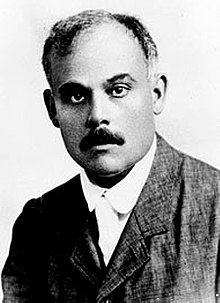Oszkár Jászi
| Oszkár Jászi | |
|---|---|
 |
|
| Minister for National Minorities | |
|
In office 31 October 1918 – 19 January 1919 |
|
| Preceded by | position created |
| Succeeded by | Dénes Berinkey |
| Personal details | |
| Born |
2 March 1875 Nagykároly, Austria-Hungary (today Carei, Romania) |
| Died | 13 February 1957 (aged 81) Oberlin, Ohio, United States |
| Nationality | Hungarian |
| Political party | Civic Radical Party (PRP) |
| Spouse(s) |
Anna Lesznai (1913–1918) Recha Wohlmann (1924–?) |
| Children | Andrew Jaszi |
| Profession | sociologist, politician |
Oszkár Jászi (March 2, 1875, Nagykároly – February 13, 1957, Oberlin, Ohio), also known in English as Oscar Jászi, was a Hungarian social scientist, historian, and politician.
Oszkár Jászi was born in Nagykároly on March 2, 1875. His hometown was, as he put it in his unfinished memoirs, "the county seat of Szatmár, the center of a rich agricultural area, it was a major factor in Hungary's economic, municipal and political life." His father, Ferenc Jászi (1838–1910), was a family physician and (in his son's words) "an honorable, humane freethinker" who had had his family name changed from Jakubovits in 1881, a "typical symptom of the very strong and seemingly unqualified drive for assimilation that he and many Jewish contemporaries displayed around that time... This was the family climate that gave rise in the then six-year-old Oszkár to a self-image whereby for a long time thereafter he was simply unwilling to acknowledge his Jewish origins." The family also converted to Calvinism around the same time.
Oszkár's mother, Roza Liebermann (1853–1931), was the widowed doctor's second wife. Oszkár attended "the local Piarist grammar school—the same establishment attended by Endre Ady, two years younger and later to become the supreme poet of their generation (though the two became friends, this dated from their adult years)." Having done very well academically, he graduated a year early at seventeen, in 1892, and studied political science at the University of Budapest under Ágost Pulszky; he was also strongly influenced by Gyula Pikler, though he would later reject the latter's "doctrinaire, anti-historical positivism." At this point he admired figures like József Eötvös and Pál Gyulai, thus aligning himself with "the principled European strand of Hungarian liberalism that stood against clericalism and the blustering nationalism of those who sought independence from Austria." He was awarded his diploma as Doctor of Political Science on July 2, 1896.
...
Wikipedia
